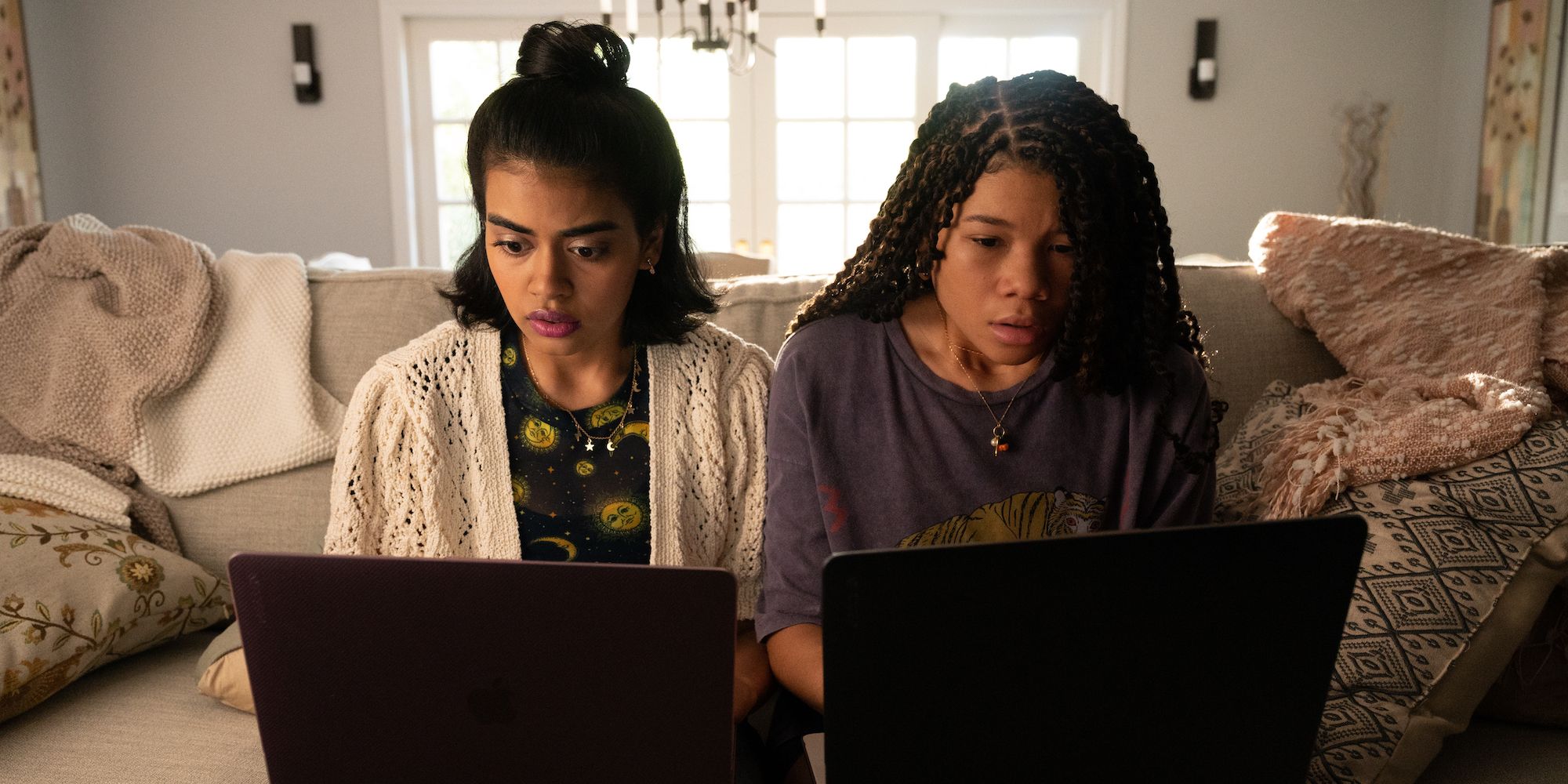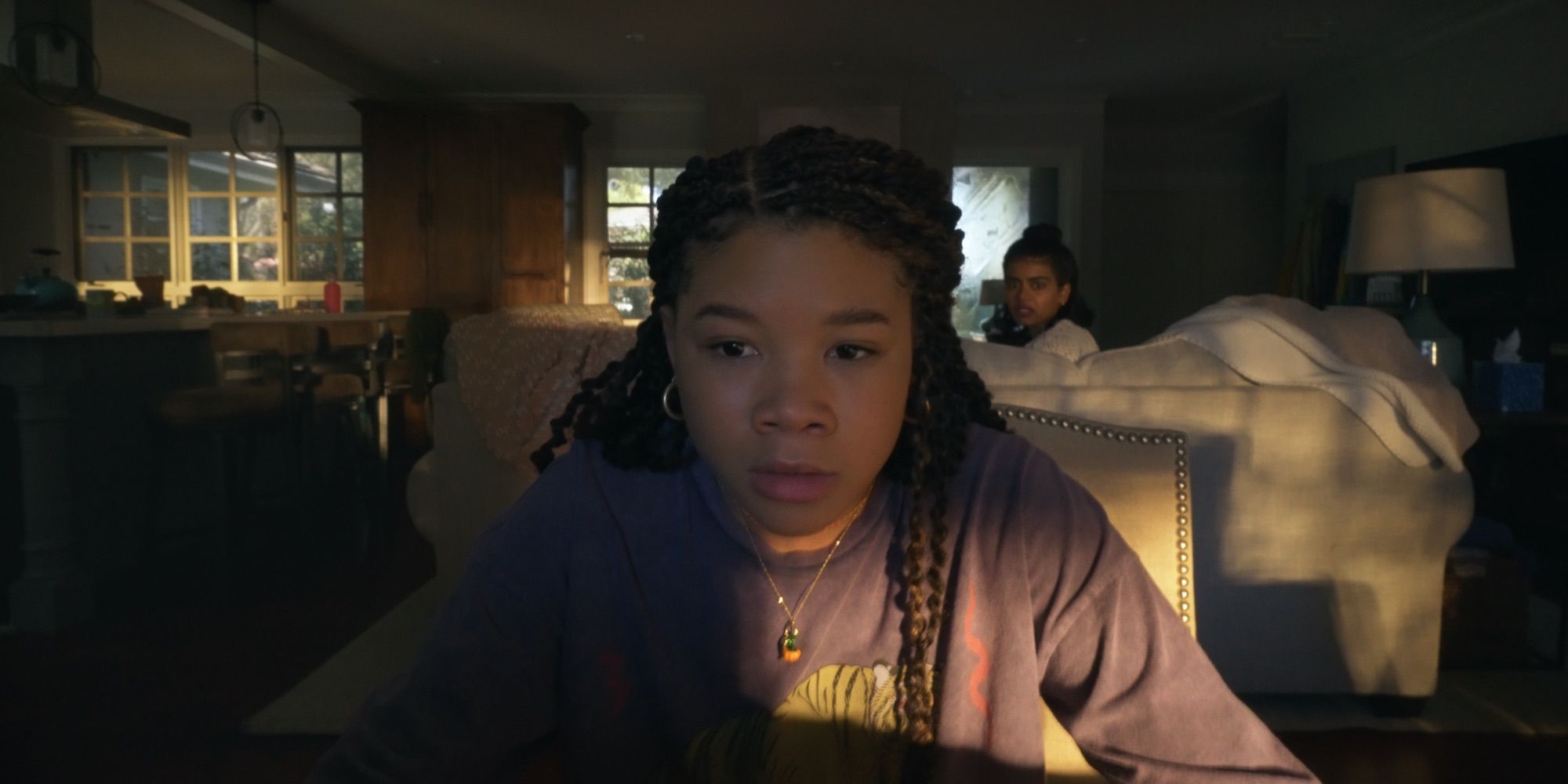Missing, the spiritual follow-up to the well-received 2018 thriller Searching, proves that its predecessor's unique screens-only storytelling approach was far from a novelty. Missing is a true rollercoaster of a movie, thanks in large part to meticulous direction by Nicholas D. Johnson and Will Merrick and a smart, snappy screenplay and story by Merrick, Johnson, and Sev Ohanian. The film stars Storm Reid as June, Nia Long as her mother Grace, and Ken Leung as Kevin, all of whom (in addition to the supporting cast) give a sense of heart-stopping weight to every choreographed mouse movement and closed browser window.
Another standout aspect of Missing is the score by Julian Scherle. Scherle cut his teeth working in the music department on shows like Mr. Robot, and he is a versatile composer who combined an instrumental background with a deep dive into electronic music and techniques to best suit the nature of Missing. The result is a score that turns from emotionally resonant to suspenseful and intense on a dime, perfectly complementing the action—or the unnerving lack of it—on screen.
Julian Scherle spoke with Screen Rant about the unique way in which he conceptualized and created his score for Missing, and how his interest in movie music developed
Julian Scherle on Missing
Screen Rant: I'd love to know how you found your way into working on this film.
Julian Scherle: I knew Natalie Qasabian, one of the producers, from years ago. We'd worked on a short movie, like five, six years ago, and we were always looking for some other project to collaborate on again. It was always kind of on her mind.
Then, I release music under different pseudonyms, and one of them is Són. The directors found that release and were listening to it while they were writing the screenplay for Missing. At some point they were like, "Yeah, we should hit up this guy and see who's behind that." It turned out it was me, and Natalie was like, "Oh, yeah, I know this guy."
I see all those synths behind you, but I first heard your music in the documentary Buried: The 1982 Alpine Meadows Avalanche, which was very string-heavy. Have you always had an interest in synths, or was that something that developed after an instrumental background?
Julian Scherle: The second, yeah. I started playing piano when I was a kid. [I took] classical piano lessons for, I don't know, thirteen years or so. Also, the school that I went to [did] a lot of analysis of classical music. I hated it back then. Now, I appreciate it a little bit more, but all I wanted to do was play in punk bands, and make noise, and not give a f*** about classical music. That really led me to electronic music.
Early on, I was a huge fan of bands like Depeche Mode, for instance - a lot of synth stuff. Marilyn Manson was another big one when I was young, which is all synth-based stuff. At some point, I kind of went away from playing in punk bands and started doing more of my own music. It's also very easy to do electronic music if it's just you, so I definitely at some point discovered this gigantic field of electronic music. I was like, "Wow, this is fantastic."
I also really love collaborating and working with talented musicians, and for the avalanche documentary, you're right, it's a completely different approach to scoring. Every project is different, and every kind of score has to fit to whatever the feel of the movie is. I don't limit myself just to synth scores, but it's definitely something that I feel very passionate and excited about - to do scores that are a little bit more experimental.
Can you talk about how you approached this score from a conceptual standpoint? I know you did a lot of audio manipulation and things like that.
Julian Scherle: Yeah. So, if someone hasn't seen the movie, basically the entire story is told through screens. The basic question that the directors and I asked was, "What's the human-machine interface, and what kind of information gets lost by communicating through some medium in between? And what does that mean for audio?" [I looked at] what kind of audio artifacts get created by compressing audio and then decompressing it on the other side, and what gets lost along the way.
The first thing that I wanted to explore was audio compression in general, [wondering] "What does audio compression do? How does that affect how we perceive audio once it's compressed?" There was this really interesting study that I found that basically found a correlation [between] the heavier the compression rate is [and] the more anxiety-inducing the output signal is. They had orchestral instruments, and then they compressed those, and had some random audience listen to it, and basically just rate how uncomfortable [they] felt. It was pretty clear that audio compression has psychological effects on us that we're not even aware of. I was thinking, "What happens if I compress it not one time, but thousands of times?" and it's basically just artifacts of compression that I created with that. I used all kinds of different input signals and did that to different sounds; [I] experimented and saw what the output would be.
Another element I wanted to use was AI and machine learning, and I found this platform for resynthesis. Basically, you have a signal that you feed into a system, and then it resynthesizes that sound and makes it sound like something completely different. It's an experimental platform, and they have some pre-trained systems for, like, a violin, for instance. You can have your cat purr, or meow, and then you put it into that system, and then a violin is basically playing what the cat is doing. I found that you can also train your own systems, so instead of using the pre-trained algorithms that they have for violin, you can train your own systems. It's very, very time-consuming to do that, but for instance, I would use the mp3 [files] that I created and train a system based on that, or I would take dialogue snippets from set from Storm Reid and train that. Bernard Herrmann is one of my favorite composers - I would take snippets of his core structures, train a system like that, and feed all kinds of different things [into] that.
The third one was that I had this special microphone that doesn't pick up audio signal. It's based on air pressure changes, so it's not like your ear would work. It's not a regular microphone, but it picks up electric interference. If you take that, and you go over your screens, or your laptop, or iPad, or anything that has a circuit in it with voltage changes, it picks up those signals. That's all over the score as well. Any kind of voltage change creates textures, [or] sometimes it creates certain patterns. I recorded hours and hours of that, and cut it down into pieces that I thought were cool, and also applied that to the other two things that I talked about earlier.
Is that microphone picking up any sort of pitch, or is it just noise?
Julian Scherle: A lot of it is noise. It's really harsh, brutal stuff—a lot of times very high-frequency stuff, sometimes very low-frequency stuff - so you've got to be really careful using it. I used it for all kinds of different elements, so it's in pads, it's in drones, but [there are] also rhythmical elements that I used from that. One thing that I really wanted to achieve with this is [that] I wanted to make you feel like you were inside June. Even though it's a big theater, I wanted it to feel claustrophobic at some points throughout the movie. Because that microphone literally doesn't get any air movement, it's basically as if it would be right in your ear. There's no distance between you and that sound.
How much did you blend in live instruments as well?
Julian Scherle: The contrast to this really claustrophobic, anxiety-inducing electric stuff is very close-miked, organic, cozy, warm sound. That's my upright piano, and I made sure to have all the little tactile sounds, like if you press the key, [so] you really feel like you're there next to the piano. Again, very, very close, very claustrophobic. Piano was all over the score, and then I did record some strings. I did also have some overlap where I had the orchestrated create, basically, some of those electrical interference sounds. That was kind of cool. [I took] some pads or drums that were from the electric side and then I had the orchestra play that instead.
For the Columbia section, I didn't want [it to be where] you see Colombia, and then you hear a pan flute play. I generally don't agree with that kind of scoring, but also, it wouldn't fit the movie. I still recorded some authentic Colombian instruments and mangled them digitally and electronically, so you still have a little bit of that texture. You get a little bit of the texture of a pan flute, for instance, but you can't really tell it's a pan flute.
Because of the unique way the story of Missing is told, did you have to approach it differently than you would another movie or TV series?
Julian Scherle: It was similar [in that] you have to write all the themes for the main points of the movie and attach that to certain characters and story points, but because you don't have much exposition visually, you have to really guide the audience with the music. If you see June's mouse pointer going over there, hovering over a picture, that's a whole story that you have to tell. What's the realization that she has? What's the idea that's coming up? Why is she questioning this? It has to be basically microscope-scored - every small beat. It's almost wall-to-wall sound in the movie, and every small change has to be told through music, so it's definitely a little bit different.
Did it take you a while to settle into making it suspenseful when someone's opening Gmail? It seems like it would be difficult to make that feel human, but you do such a good job.
Julian Scherle: Thank you very much. I mean, that's attributed to the really brilliant directors and producers that had very skillful control over when to feel what. We re-scored certain scenes in different styles, and kind of fine-tuned it, [thinking], "Okay, so how do we feel in this scene, and how does that affect how we will feel all the way at the end of the movie?" We had all those different parameters, and we were balancing until it felt right. [There was] a lot of conversation about, "What is June going through at that moment, and what's really in her head?" Then, you can take that and score it appropriately.
About Missing
From the minds behind Searching comes Missing, a thrilling roller-coaster mystery that makes you wonder how well you know those closest to you. When her mother (Nia Long) disappears while on vacation in Colombia with her new boyfriend, June's (Storm Reid) search for answers is hindered by international red tape. Stuck thousands of miles away in Los Angeles, June creatively uses all the latest technology at her fingertips to try and find her before it's too late. But as she digs deeper, her digital sleuthing raises more questions than answers...and when June unravels secrets about her mom, she discovers that she never really knew her at all.
Find our other Missing interviews here:
Missing is in theaters now, and Julian Scherle's soundtrack album is available for streaming on digital platforms.



